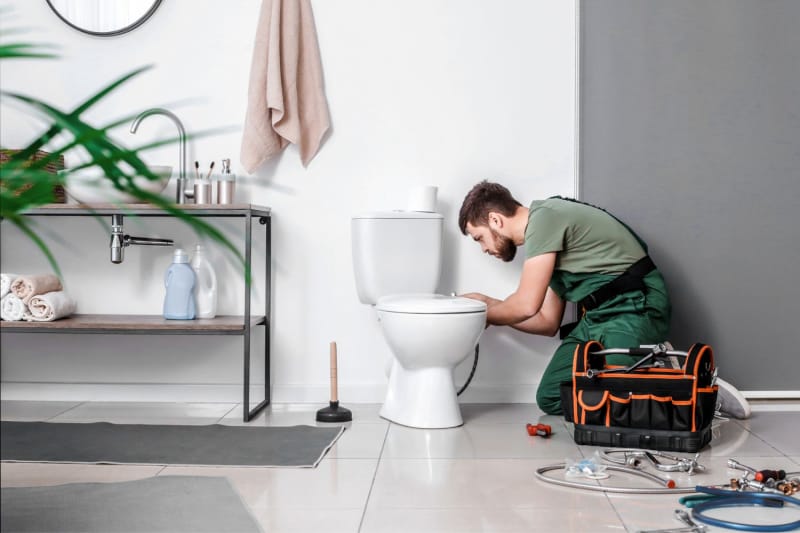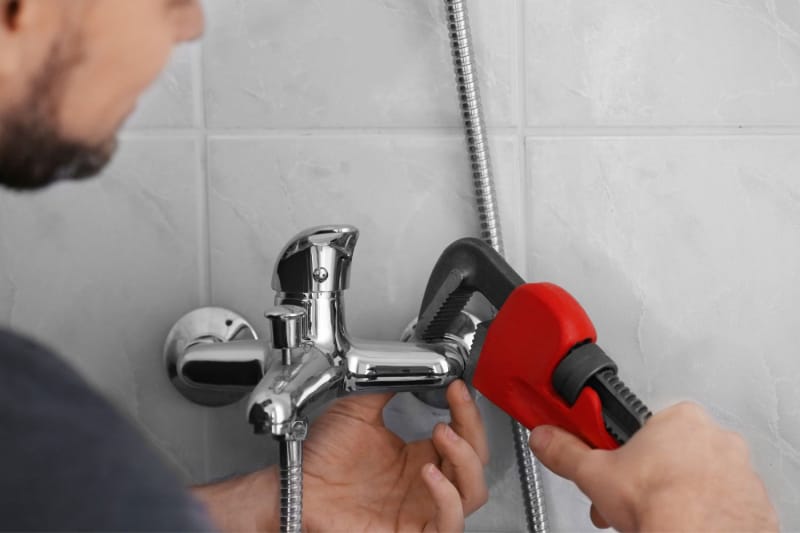Comment développer votre entreprise de plomberie et augmenter vos revenus en 11 étapes
Bonjour, mon ami, bonjour encore ; aujourd’hui, nous nous réunissons pour parler de Comment développer votre entreprise de plomberie et augmenter vos revenus en 11 étapes et j’espère que ce blog pourra vous aider.
Les plombiers qui envisagent de créer leur propre entreprise voudront apprendre à développer une entreprise de plomberie pour aider leur entreprise à démarrer et à la maintenir rentable.
La plomberie est un secteur en pleine expansion qui est essentiel au bon fonctionnement des résidences individuelles, des entreprises et des institutions. Sans les professionnels de la plomberie, les systèmes urbains tomberaient en ruine, ce qui entraînerait des problèmes importants au niveau du système de drainage et du système d’approvisionnement en eau, ainsi que de plusieurs autres éléments clés de l’infrastructure urbaine. Compte tenu de l’importance des connaissances, des compétences et de la formation en matière de plomberie, devenir plombier est une excellente idée. Depuis que le salaire moyen d'un plombier est de $60 090, il peut également s’agir d’une carrière lucrative.
Les compagnons et les maîtres plombiers peuvent faire avancer leur carrière en créant une entreprise de plomberie. Cependant, il est important qu’ils apprennent à développer une entreprise de plomberie en élaborant un plan d’affaires, en constituant une équipe de plombiers et d’autres employés performants et en mettant en œuvre les meilleures idées de publicité pour la plomberie afin de mieux commercialiser l’entreprise. Les futurs propriétaires d’entreprises de plomberie voudront apprendre comment développer une entreprise de plomberie afin de partir du bon pied.
Avant de commencer…
Comme pour toute entreprise, le propriétaire de l’entreprise doit avoir une connaissance et une expérience approfondies des produits et des services qu’il propose. En règle générale, une personne étudie en tant qu’apprenti plombier pendant plusieurs années, et peut prévoir un budget pour les années suivantes. coûts de l’école de plomberie ou de prendre une partie de la meilleurs cours de plomberie en ligne avant obtenir une licence de plomberie pour travailler en tant que compagnon plombier. Après avoir obtenu cette certification, les compagnons plombiers peuvent créer une entreprise de plomberie ou approfondir leur apprentissage en devenir maître plombier. Les maîtres plombiers qui choisissent de créer une entreprise de plomberie peuvent embaucher des apprentis plombiers pour les aider à effectuer les travaux les plus difficiles, au lieu d’embaucher des compagnons plombiers à un taux plus élevé. Ils devront se renseigner sur le renouvellement de la licence de plomberie et sur les exigences en matière d’assurance de l’entreprise de plomberie dans leur État afin de s’assurer qu’ils exercent leurs activités en toute légalité.
Au-delà des compétences techniques, il est également conseillé à un futur chef d’entreprise de suivre un cours de gestion d’entreprise de base avant de créer une nouvelle société. Des professionnels expérimentés peuvent discuter de la meilleure façon de commercialiser une entreprise de plomberie, de la manière de développer une entreprise de plomberie et fournir des conseils de gestion de plomberie pour aider à développer l’entreprise. Si certains aspects commerciaux sont difficiles à saisir, il n’est pas inutile que l’étudiant envisage un coaching en plomberie ou des services de conseil en plomberie afin d’améliorer la rentabilité de l’entreprise de plomberie.
Conseils pour Comment développer une entreprise de plomberie
- Créer et développer des relations avec les fournisseurs locaux.
- Réévaluer et analyser régulièrement le plan d’entreprise.
- L’accent est mis sur la qualité de l’assistance à la clientèle, la rapidité de la communication et la fiabilité du service.
- Envisagez de proposer des services d’intervention d’urgence 24 heures sur 24 et 7 jours sur 7.
- Trouver un créneau sur le marché local actuel.
- Envisagez d’annoncer vos services de plomberie sur un site de génération de leads.
ÉTAPE 1 : Rédigez un plan d’entreprise à long terme qui décrit la situation actuelle de votre entreprise et l’objectif que vous souhaitez atteindre à l’avenir.
La première étape de la croissance d’une entreprise de plomberie consiste, pour le propriétaire, à élaborer un plan d’entreprise. En l’absence de plan, une entreprise en pleine expansion peut rapidement devenir envahissante et le propriétaire de l’entreprise peut perdre de vue l’orientation de son activité. C’est pourquoi, avant de se lancer dans une nouvelle activité, le plombier devra consacrer du temps à l’élaboration d’un plan d’entreprise à long terme. Ce plan décrira la situation actuelle de l’entreprise, les objectifs à court terme, les initiatives en cours et les objectifs à long terme.
Si l’élaboration d’un plan semble difficile au départ, les plombiers peuvent commencer par se poser quelques questions simples. Où en sera l’entreprise dans cinq ans ? De combien d’employés l’entreprise aura-t-elle besoin ? Où l’entreprise sera-t-elle située ? L’entreprise se spécialisera-t-elle dans un créneau particulier ou se généralisera-t-elle ? Quelle sera la taille de l’entreprise ? Où en sera l’entreprise dans 10 ans ? Quels services l’entreprise proposera-t-elle ? Quelles seront les heures d’ouverture ? Comment les clients contacteront-ils l’entreprise et prendront-ils rendez-vous ?
Après avoir élaboré un plan d’affaires à long terme pour l’entreprise, le propriétaire devra régulièrement réévaluer le plan pour s’assurer que l’entreprise est sur la bonne voie. Il devra apporter les modifications nécessaires au plan d’affaires pour que l’entreprise continue à progresser vers les objectifs à long terme qui ont été fixés à l’origine.

ÉTAPE 2 : Gérer soigneusement les finances de l’entreprise pour garantir un flux de trésorerie régulier, réduire les frais généraux et identifier les domaines à améliorer.
Si la plomberie est un travail pratique, la gestion financière est essentielle à la réussite de toute entreprise. Une entreprise ne peut pas se développer si elle ne génère pas un flux de trésorerie fiable, et il est nécessaire de surveiller de près tous les domaines qui peuvent être améliorés. Lorsqu’il démarre une entreprise de plomberie, le propriétaire doit investir dans des outils, des véhicules, du matériel de marketing, un emplacement, un site Web et les employés qu’il prévoit d’embaucher. Il devra également prendre en compte les coût de l'assurance pour les petites entreprisesLa plupart des pays d’Europe centrale et orientale ont une politique d’assurance de la qualité. meilleures compagnies d'assurance pour petites entreprises (tel que Assurance NEXT ou Dé) peut contribuer à protéger l’entreprise de toute responsabilité (et peut même être exigé par la loi). Dans cette optique, il est essentiel de suivre et d’équilibrer les recettes de l’entreprise et les dépenses effectuées.
En accordant une attention particulière aux dépenses de l’entreprise, le chef d’entreprise peut identifier les domaines où les dépenses sont excessives ou ceux où l’entreprise peut procéder à des coupes stratégiques pour réduire les investissements inutiles. De même, la réduction des frais généraux de l’entreprise peut avoir un impact positif net sur la croissance de l’entreprise. Les chefs d’entreprise peuvent envisager de trouver un espace locatif plus abordable ou de négocier des prix plus bas pour les matériaux avec un fournisseur local. Un autre moyen pour les propriétaires d’entreprise de réduire les frais généraux est d’investir dans un logiciel de gestion de la plomberie pour faciliter la gestion de l’entreprise.
Même si ce n’est pas toujours une partie de plaisir, les propriétaires d’entreprise doivent également revoir régulièrement leurs besoins en personnel. Si l’entreprise se développe rapidement au début, il est possible que le propriétaire ait embauché plus de personnel qu’il n’en fallait pour assurer le fonctionnement quotidien ; le licenciement d’une ou deux personnes peut alors contribuer à réduire les frais généraux de l’entreprise. Il est également important que les propriétaires d’entreprise évaluent le retour sur investissement (RSI) de tout nouvel investissement ou initiative, comme les programmes d’adhésion, les forfaits d’entretien ou la publicité pour les plombiers.
ÉTAPE 3 : Assurez-vous que vous avez les bons outils en stock et un nombre suffisant d’équipements pour répondre à la demande de services.
Les propriétaires d’entreprises de plomberie peuvent rechercher en ligne des termes tels que « comment obtenir plus de prospects pour mon entreprise de plomberie » ou « comment obtenir plus de clients dans le domaine de la plomberie », mais à la base d’une entreprise de plomberie se trouvent les compétences techniques nécessaires pour travailler sur les systèmes de plomberie. Si l’entreprise n’est pas en mesure d’effectuer des travaux de plomberie, elle ne réussira pas, quels que soient ses efforts de marketing. Pour mener à bien les travaux de plomberie, les plombiers doivent être compétents et expérimentés, mais ils ont également besoin des bons outils.
Lorsqu’il crée une entreprise de plomberie, le propriétaire de l’entreprise doit investir dans plusieurs jeux d’outils. Même si l’entreprise ne compte qu’une seule personne, il est bon d’avoir plus d’un jeu d’outils au cas où quelque chose se casserait. Pour les personnes qui souhaitent développer leur entreprise, il est nécessaire d’investir dans un nombre suffisant d’outils pour équiper tous les travailleurs supplémentaires.
Les outils de plomberie peuvent comprendre
- Clés à pipe
- Clés à molette
- Clés à bassin
- Clés de robinetterie
- Clés dynamométriques
- Clés à pipe internes
- Torches
- Coupe-tubes
- Plongeurs
- Tarières à main
- Serpents de drainage motorisés
- Caméras d’inspection des drains
- Machines à hydrojet
- Gants de sécurité
- Lunettes de sécurité
- Genouillères
- Masques
- Boucliers thermiques
- Extincteurs
- Trousses de premiers secours
Also, a plumbing company will typically have at least one company vehicle that is used to travel between appointments. Generally, investing in a van is the best choice for a plumbing company because the back of a van provides ample space to store a wide range of tools and materials, such as pipes, fittings, solder, flux paste, sandpaper, and fitting brushes.
STEP 4: Invest in quality software to help you run your business, such as a customer relationship management (CRM) system.
Technology has advanced significantly to the point where most companies rely on various software products to help manage scheduling, contact profiles, and even finances. Investing in one of the best plumbing software products comme Jobber can help business owners increase the efficiency of the company while reducing overhead costs. One such product is known as a customer relationship management (CRM) system. This tool allows the company to collect and store customers’ contact information, including names, phone numbers, and email addresses.
By keeping this information neatly organized and accessible, a plumbing CRM tool makes it easier for business owners to reach out to customers with company updates, sales, membership programs, and new package offerings to help attract business. Some companies may even choose to use this system to contact return customers, warning them about upcoming inclement weather or natural hazards. Business owners will want to keep in mind that severe winter weather can lead to frozen water lines, so putting out this notice ahead of time may improve the reputation of the company and direct customers to the business.
Other software programs are also important for operating a business. Companies that employ more than one person may want to look into payroll software to ensure there are no issues when payday rolls around. Additionally, financial management software can be useful for organizing, reviewing, and managing income and expenses for the company.
STEP 5: Build a team of hardworking and reliable employees, and invest in them by offering ongoing training opportunities.
A single-person plumbing business can be a good way to get started. The overhead is low and the only worker the business owner needs to worry about is themselves. However, a small business like that cannot take on a lot of extra work, so it cannot grow without investing in new employees. Those who want to develop the business beyond the humble single-person beginnings will want to start looking for hardworking and reliable workers to support the company.
Adding a few extra plumbers to the business allows the company to take on more work, which generates a higher income. Though, before hiring any new plumbers, it’s important for the business owner to ensure that they are licensed, trained, and experienced in the industry. Master plumbers may also choose to take on one or more apprentices, which can be a great way to accept more work without paying high overhead costs for journeyman plumbers.
Another important job that will need to be filled is the dispatcher position. Ideally, this person will have experience working in the plumbing industry, so they can understand and respond to the information provided by a customer. Dispatchers address problems, answer questions, and prioritize service requests. This helps ensure that the work is completed in an efficient and orderly manner.
Some business owners will manage the finances of the company on their own, but other business owners may need help to ensure the company stays on track. Hiring an accountant can be a good way for a business owner to organize the company finances and identify areas of wasteful spending in order to reduce the overall expenses for the business.

STEP 6: Make sure your website is easy to use and can be found by customers when they’re searching for a plumber in their area.
Word of mouth is a good way to increase the reputation of a plumbing company, but even after getting a referral from a friend or family member, many people want to do their own research on a company. A website is an essential part of a successful business because it can be used to provide information on the company, services offered, currently running promotions, pricing, and more.
Individuals with basic computer knowledge can build a simple website through an online provider. This will allow the company to post contact information, prices, and other details to inform prospective customers. Alternatively, the company can invest in a professionally built website. While this will cost more up front, a professional website has a more authentic look that can be used to improve the reputation of the company, giving prospective customers more confidence in the business.
Additionally, business owners can hire individuals who are experienced with search engine optimization (SEO) to create the content on the website. SEO is essentially a set of practices and tasks that can be used to help the website show up on a search results page when a potential customer searches online for “engager un plombier près de chez moi.” Increasing the traffic to the site can then lead to more customers and higher profits.
Le meilleurs services de plomberie often deal with emergencies, so the website will need to have easy-to-find business information on its main page. Customers will be able to find a number to call quickly, allowing them to get help as soon as possible in the event of a serious leak or flood. Also, it’s recommended that the business post testimonials on its website, as well as up-front pricing and payment options.
STEP 7: Develop a marketing strategy to attract new customers to your business, and make sure you have a recognizable brand.
Given that plumbing is one of the oldest trades practiced widely throughout the world, it will come as no surprise that there will be competition anytime a plumber starts a new plumbing business. In order to stand out in the local market, it’s necessary for a business owner to come up with concrete marketing strategies to attract new and returning business. Marketing can be as easy as handing out plumbing business cards to every customer or building a company website where prospective customers can review testimonials and check out a portfolio of completed projects.
CONSEIL DE PRO
“Regularly check the promotions, service offerings, and reviews of the competition to help determine what customers value most, both positively and negatively. Use this information to offer attractive promotions to new and repeat customers, as well as adding services that may not be widely available through other plumbing companies in the area.”
—Timothy Dale, BobVila.com contributeur et ancien gestionnaire de projets de plomberie industrielle, commerciale et institutionnelle (ICI)
Beyond a simple website, plumbing companies may choose to market through a wide range of options, such as building multiple social media platforms to advertise ongoing deals or display completed jobs. Small businesses can also invest in paid advertising programs on the radio, online, or even in the local newspaper.
Tech-savvy business owners can reach out to new and returning customers through online banners or pop-up ads, or they can even put together a series of conseils de plomberie videos or simple how-to videos on YouTube. If this seems too complicated, other marketing strategies include investing in flyers, billboards, or print bulletins.
Building a recognizable brand for the company will improve the reputation of the business and increase the likelihood of return business. Business owners may want to consider providing one or more special services, such as replacing water heaters or installing boilers, to stand out from competitors in their local market.
STEP 8: Sign up for lead-generation services such as Angi, HomeAdvisor, Thumbtack, and Handy.
A relatively easy way for a plumber to get more clients is to create business profiles on popular lead-generation sites such as Angi, AccueilAdvisor, Punaise, et Pratique. These websites allow customers to search for businesses in their area, read reviews of local businesses, and request quotes for their projects. If a potential customer requests a quote, the plumber will pay a lead fee; the exact fee will depend on the platform.
Lead-generation sites tend to appear toward the top of the search results page, so customers performing an online search for “plumber near me” will often visit these sites to view local pros in their area. If the plumber’s business is not included in the listings, they’ll be missing out on new clients.
STEP 9: Build up your reputation by asking customers to write reviews of your business and by implementing a referral program for existing customers.
Marketing can be targeted, such as when a company offers maintenance contracts, subscriptioñ services, or membership programs to new and returning customers. However, to grow a business, the owner will also need to think beyond direct targeting methods to attract a wider pool of customers. This can be accomplished by building the reputation of the company so that it’s the first name that comes to mind when something goes wrong with a plumbing system.
There are many ways to grow the reputation of a business, but the most common method is to ask customers to write reviews or testimonials for the business. These testimonials can then be displayed on the company website. Similarly, a company may implement a referral program for existing customers as a way of increasing new business while encouraging repeat business.
Another way to improve the reputation of the company is to help out in the community. The company can sponsor a local kids sports team, donate to a local charity, or even devote time and aid during a local crisis. Providing a friends and neighbors discount can show nearby residents and businesses that they are recognized and appreciated, which can help to improve the standing of the business in the local community.

STEP 10: Make sure your pricing is competitive and can generate sufficient profits to support the continuation and growth of the business.
It’s difficult to grow a business when the pricing structure does not allow the company to bring in enough income. Ideally, a plumbing business will have competitive pricing that is both profitable and sustainable. While a weekend sale or a holiday promotion can drive up the profitability of the business, it’s not a sustainable method. Similarly, if the company is not charging enough to cover the overhead costs, then the business will have a difficult time just staying afloat.
Unfortunately, customers rarely appreciate when the prices need to be increased, so before making any changes, it’s imperative that the business owner conduct thorough research within the local market to find out combien coûte un plombier. This will help the business owner better understand the pricing strategies of their competitors while identifying new opportunities in the local market.
After coming up with a way to adjust the pricing strategy to better align with the current market conditions and customer demand, the business owner can then conduct a cost analysis to determine if the new strategy ensures the ongoing growth, profitability, and sustainability of the business.
New price changes can be a challenging factor to overcome, but there are a few ways for business owners to do this without alienating existing customers. They’ll want to start the process by communicating the reasons for the change. Most customers will understand a need to bump up the pricing, as long as the increase is reasonable. Business owners can use incremental increases to reduce the sudden shock of a big price increase, or even offer services at a discounted rate for a small selection of loyal customers.
STEP 11: Consider offering maintenance contracts, subscription services, service agreements, or membership programs to generate a recurring revenue stream.
Once the business is established and has started completing jobs in the area, the business owner can try out a variety of services, service packages, and other methods for generating a recurring revenue stream. Offering a maintenance contract for sump pumps, water heaters, or boiler systems could be a good way to increase customer retention. The customer pays a set amount per month or per year, and they receive regular service to keep their home systems in working order.
Another option is for the business to offer a subscription service for routine plumbing tasks, such as drain cleaning, water heater inspections, or winterizing services for irrigation systems. Similarly, some companies will offer monthly service agreements to help retain customers. The customer pays a recurring fee so that they can receive a discount on repairs and installations.
Membership programs are an interesting option to consider. Some companies will use a membership program in the same way as a service agreement, but adding a fee to this program may not be an effective solution. Instead of paying a monthly fee, customers simply sign up for a free company membership, which ensures they receive priority service, reduced pricing, or exclusive product discounts. This generates a high level of customer loyalty and can increase the chance of returning business—and even the chance of the customer tipping the plumber for a job well done.
Building a successful plumbing business takes time and dedication. The small-business owner will need to develop a solid long-term plan; put together the necessary finances; purchase tools, vehicles, and other items; and hire additional staff, including plumbers, dispatchers, and an accountant to keep the company finances neatly organized.
Management software can be used to increase the efficiency of the company while lowering the overhead costs, but the business owner will still need to invest in a company website and marketing materials to advertise the business in the local community. Increasing the reputation of the business can help to attract customers, though it’s important for the business owner to ensure that the pricing is competitive, profitable, and sustainable; otherwise the company will struggle to remain afloat.
Business owners may want to consider pursuing alternative methods for generating a recurring revenue stream, such as offering maintenance contracts, subscription services, or other programs. They’ll also want to stay focused on the short-term and long-term goals of the company to increase profits, improve productivity, and grow the plumbing business.






